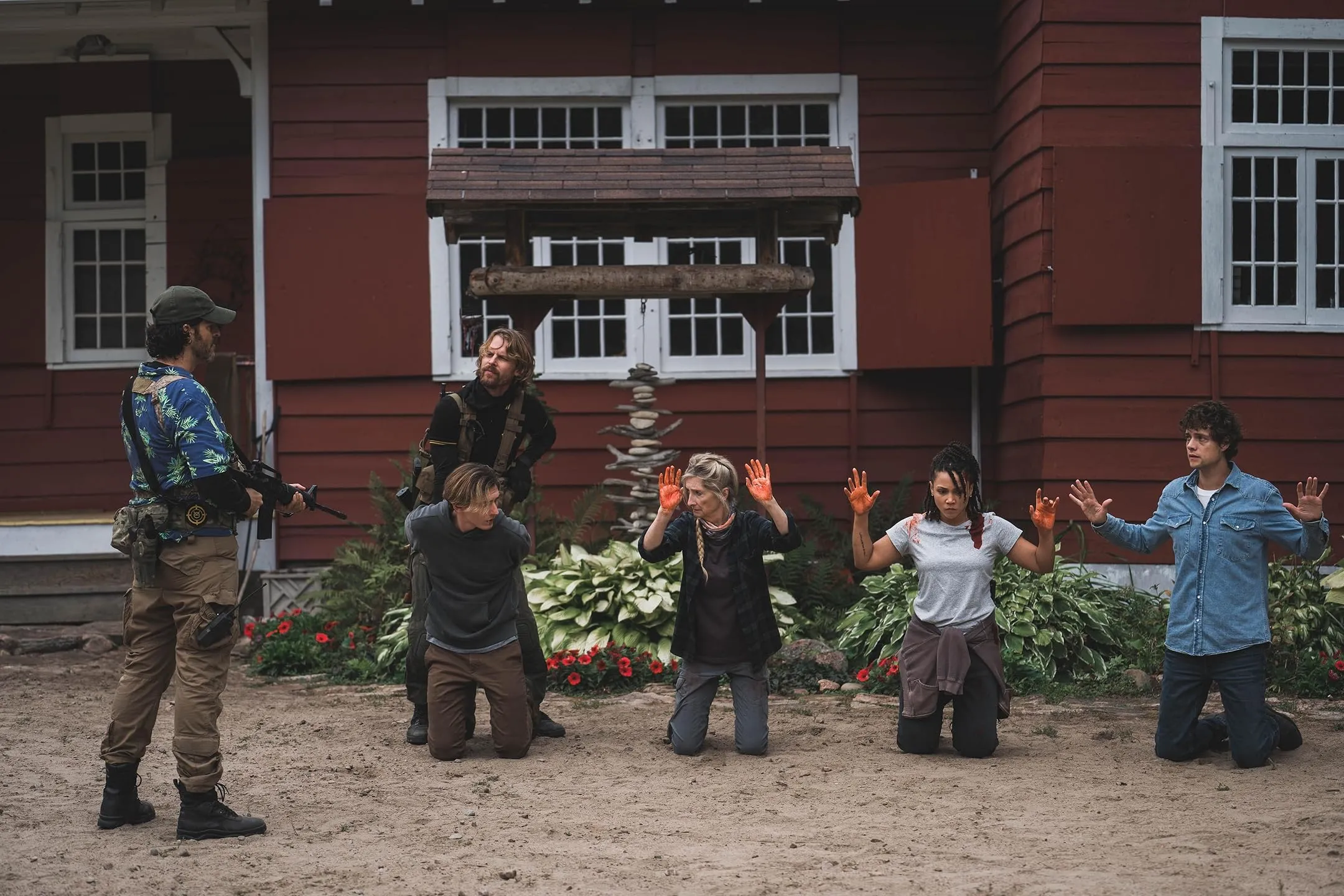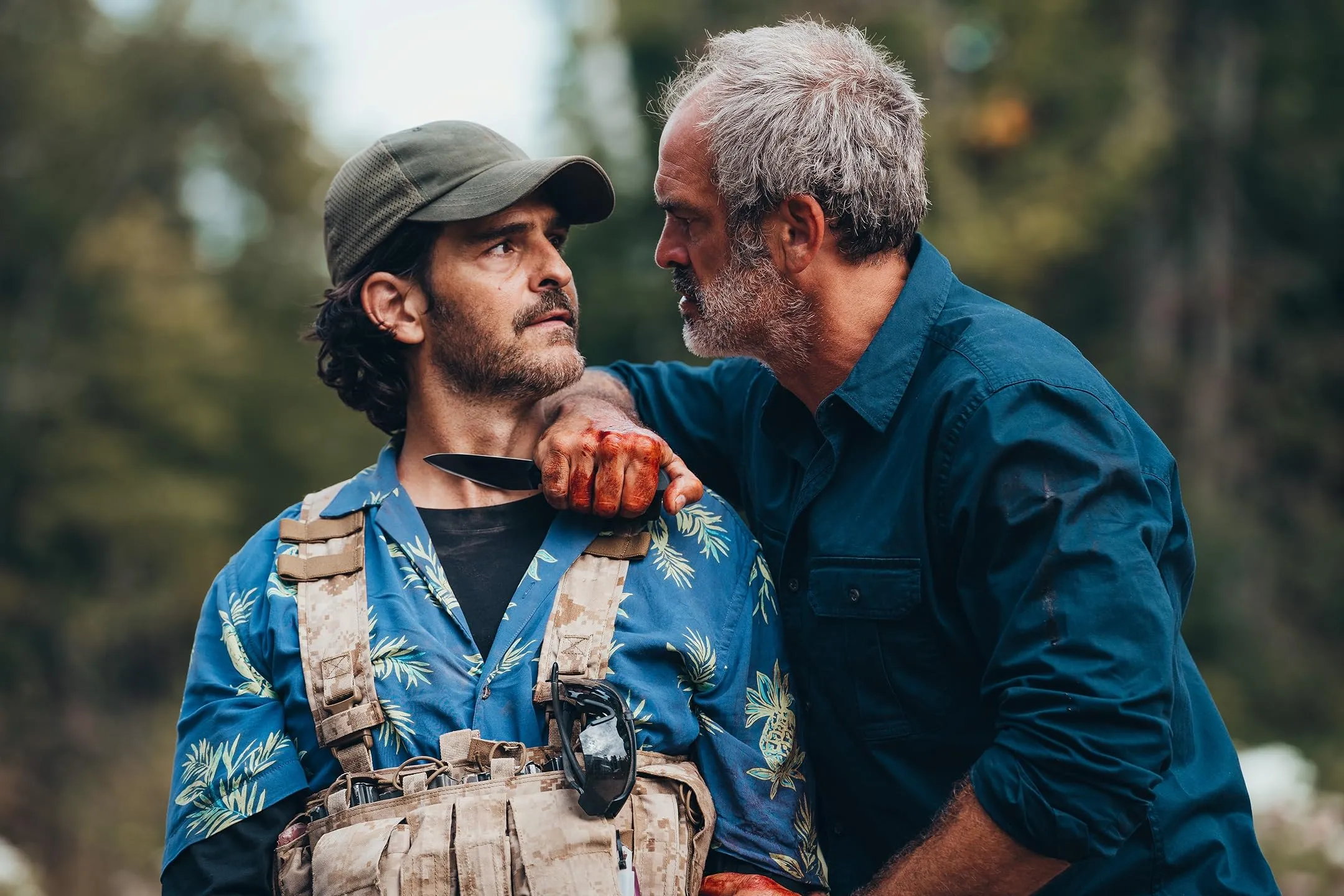The genre of near-future apocalypse has become a crowded field, a cinematic landscape littered with the husks of failed societies and cautionary tales. Mackenzie Donaldson’s “All the Lost Ones” wades into this territory, presenting a North America not shattered by alien invasion or nuclear fire, but fractured from within.
The catalyst is frighteningly plausible: a crisis over contaminated tap water spawns a political schism. On one side are the environmentalist resistors, proponents of a life-saving “Clean Water Bill.” On the other, the United Conservancy, a right-wing militia that has, through means left entirely to the imagination, seized control of the Northeastern seaboard.
The film wisely narrows its focus from this continental conflict to an intimate stage. We are not with the generals or politicians. We are in a remote Ontario lake house with a small group of resistors in hiding. They are a blended family of fugitives, attempting to survive both the enemy without and the tensions within. Here, the war is not one of armies but of whispers, of dwindling supplies, and of the terrifying uncertainty of who might appear at the edge of the woods.
A World of Premise Decay
A film’s internal logic is its constitution; violate it, and the whole structure collapses. “All the Lost Ones” begins with a specific, potent idea—a war over water—and then promptly forgets about it. This is a story suffering from an acute case of what might be termed premise decay.
The very characters fighting because of a contaminated water supply repeatedly swim and wash in a local lake with a shocking lack of concern. It is not just an oversight; it is a fundamental betrayal of the narrative’s own stakes.
The larger world-building is just as porous. A militia has occupied a significant portion of two countries, a feat of logistics and force that apparently occurred while the entire US military was on vacation. This shaky foundation supports a story of jarring tonal lurches. The group is introduced celebrating six months of survival with a boisterous party, only to be suddenly reduced to hunting rats for food.
A dead body, gruesomely mutilated, appears in the lake for a moment of shock, then vanishes from the plot and the characters’ minds forever. The audience cannot invest in a world whose rules are so casually discarded. The film sets a stage for high-stakes drama and then asks us to ignore that the stage itself is on fire.
The Cardboard People
A crisis reveals character, or so the saying goes. In “All the Lost Ones,” it reveals a collection of archetypes seemingly assembled from a kit. Our protagonist is Nia, a pregnant resistor who feels conflicted about hiding.
Her partner, Ethan, wants to settle down. Her sister, Penny, is a doctor. These are not people; they are functions. The script withholds the most basic details that would grant them life—what did they do before the world fell apart? What skills do they possess beyond looking worried?
Their interactions are stilted, their dialogue a minefield of unnatural pronouncements. When Nia finds herself in a firefight, she quips a political slogan (“My body, my choice”) in a moment so bizarrely out of place it shatters any existing tension. The film’s central romance lacks any discernible heat, and a subplot involving Penny and a much younger man is more uncomfortable than insightful.
The actors do what they can with the material. Jasmine Mathews, as Nia, brings a raw emotional energy that the script does not earn. Yet even her commitment cannot salvage scenes built on such flimsy foundations. The antagonists fare no better. Led by Devon Sawa’s snarling Conrad, they are one-dimensional monsters, their villainy as deep as a puddle.
A Polished Surface on a Hollow Core
For all its narrative failings, the film is not without its technical merits. There are moments when the craft on display almost tricks you into believing in the story. Trevor Yuile’s musical score is a standout, a genuinely effective tool for building suspense and dread where the script cannot.
The cinematography, too, has flashes of quality, capturing the menacing beauty of the Canadian wilderness. Small details in the production design, such as a radio broadcasting the weather in Fahrenheit instead of Celsius, offer clever hints of the militia’s cultural encroachment.
The action itself is a mixed bag. Some sequences achieve a brutal, frantic energy, a tense cat-and-mouse game with bloody consequences. Others devolve into nonsensical shootouts where characters with supposedly limited ammunition fire wildly into the trees.
“All the Lost Ones” is constructed around a potent, painfully relevant idea about how easily societies can crumble along ideological fault lines. These few bright spots of technical skill cannot mend the deep fractures in the story’s foundation. The film is ultimately a handsome vehicle with a sputtering engine, crippled by its own illogical plot and populated by characters too thin to cast a shadow.
All the Lost Ones premiered at the Cinéfest Sudbury International Film Festival on September 19, 2024, followed by a limited theatrical release on November 29, 2024, and wider theatrical distribution on April 18, 2025 and is available for digital rental and streaming on platforms like Fandango at Home and Prime Video as of April 2025.
Full Credits
Director: Mackenzie Donaldson
Writers: Anthony Grant, Cheryl Meyer
Producers: Yipeng Ben Lu, David J. Phillips, Yas Taalat, Mackenzie Donaldson, Chantal Kemp
Cast: Jasmine Mathews, Devon Sawa, Vinessa Antoine, Douglas Smith, Lochlyn Munro, Steven Ogg, Matthew Finlan, Anthony Grant, Sheila McCarthy, Devon Sawa
Director of Photography (Cinematographer): Ashley Iris Gill
Editor: Sydney Cowper
Composer: Trevor Yuile
The Review
All the Lost Ones
"All the Lost Ones" is a classic case of concept over execution. It presents a terrifyingly plausible scenario for societal collapse, only to abandon its own rules with frustrating inconsistency. Despite some effective filmmaking, particularly its tense musical score and moments of slick cinematography, the narrative is too riddled with contradictions to be believable. The characters are too hollow to be affecting. It stands as a significant missed opportunity, a film with a potent, relevant idea that lacks the storytelling discipline to see it through.
PROS
- A relevant and gripping premise for a modern civil war.
- An effective and suspenseful musical score.
- Moments of strong cinematography and clever production design.
CONS
- The plot is undermined by major logical inconsistencies.
- Characters are one-dimensional and lack meaningful backstories.
- Dialogue is often unnatural and clunky.
- The central conflict of the story is frequently ignored.


















































